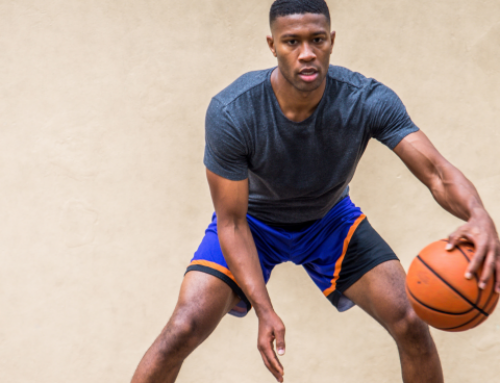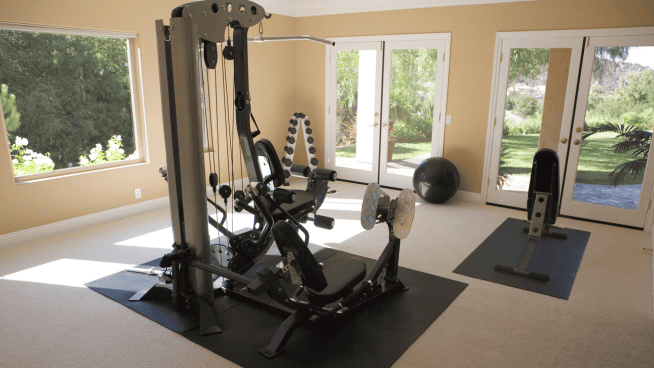Basketball Players: Build Muscle With Nutrition
Each year, basketball becomes more physical. Although height is still the predominant physical attribute of basketball players, today’s game requires them also to be strong and muscular. And the best way to build muscle for basketball is to focus on daily protein intake.
Protein serves as the primary structure of muscle. To get bigger and stronger, you need an adequate supply of protein so your muscles can recover and regenerate. Without it, your muscles won’t get bigger and may actually decrease in size, even if you work out regularly.
The recommended dietary allowance for males 14 to 18 years of age is 52 grams of protein per day. Remember, that’s the minimum amount of protein required each day. Basketball players—especially if they are strength training—require more. Most strength coaches recommend 1 gram of protein per pound of body weight for athletes looking to gain muscle mass.
The best sources of protein are lean meats, fish, chicken breast, eggs, cheese and milk. Some athletes who have a hard time consuming large amounts of food rely on protein powder supplements to fulfill their daily requirement. The best protein powders for athletes are whey protein or a mix of whey and casein protein. These ensure that you get all of the amino acids your muscles need.
A word of caution: don’t gain weight just to gain weight. In sports that require power and speed like basketball, being too heavy is as bad as being too skinny. As the needle on the scale moves up, basketball players must pay attention to their vertical jump. At a minimum, it should remain the same. Ideally, it should increase as your muscle mass increases.
Eating too many bad carbohydrates, such as sugar, candy bars, chips, pizza and nachos, may add weight, but it won’t be 100% functional muscle mass. In fact, most of it will probably be fat, or what coaches call non-functional mass. It tends to slow players down, decrease their vertical jump and eventually cause chronic injuries.
Instead, focus on fruits, vegetables and whole grains. They supply adequate, long-term energy, and minimize potential fat gains.
Find more tips for basketball nutrition in these articles:
Photo: gegeblog.com
RECOMMENDED FOR YOU
Basketball Players: Build Muscle With Nutrition
Each year, basketball becomes more physical. Although height is still the predominant physical attribute of basketball players, today’s game requires them also to be strong and muscular. And the best way to build muscle for basketball is to focus on daily protein intake.
Protein serves as the primary structure of muscle. To get bigger and stronger, you need an adequate supply of protein so your muscles can recover and regenerate. Without it, your muscles won’t get bigger and may actually decrease in size, even if you work out regularly.
The recommended dietary allowance for males 14 to 18 years of age is 52 grams of protein per day. Remember, that’s the minimum amount of protein required each day. Basketball players—especially if they are strength training—require more. Most strength coaches recommend 1 gram of protein per pound of body weight for athletes looking to gain muscle mass.
The best sources of protein are lean meats, fish, chicken breast, eggs, cheese and milk. Some athletes who have a hard time consuming large amounts of food rely on protein powder supplements to fulfill their daily requirement. The best protein powders for athletes are whey protein or a mix of whey and casein protein. These ensure that you get all of the amino acids your muscles need.
A word of caution: don’t gain weight just to gain weight. In sports that require power and speed like basketball, being too heavy is as bad as being too skinny. As the needle on the scale moves up, basketball players must pay attention to their vertical jump. At a minimum, it should remain the same. Ideally, it should increase as your muscle mass increases.
Eating too many bad carbohydrates, such as sugar, candy bars, chips, pizza and nachos, may add weight, but it won’t be 100% functional muscle mass. In fact, most of it will probably be fat, or what coaches call non-functional mass. It tends to slow players down, decrease their vertical jump and eventually cause chronic injuries.
Instead, focus on fruits, vegetables and whole grains. They supply adequate, long-term energy, and minimize potential fat gains.
Find more tips for basketball nutrition in these articles:
Photo: gegeblog.com











